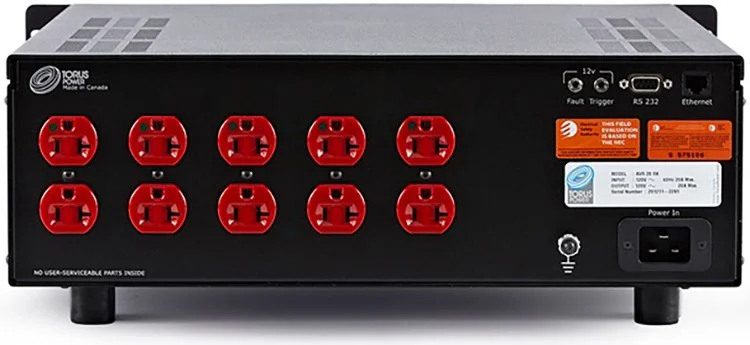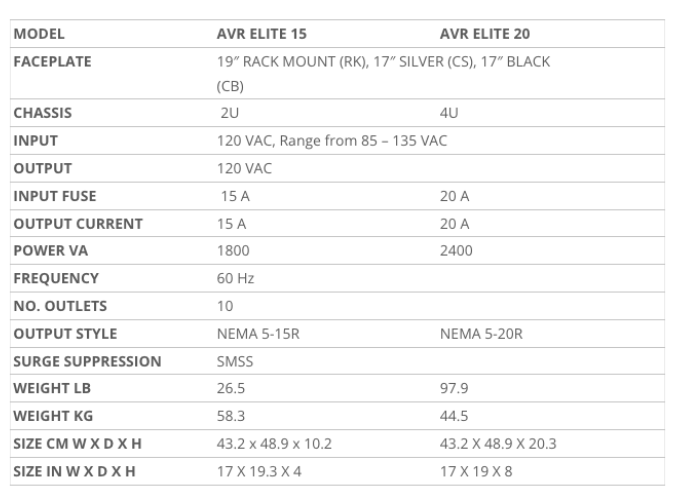TORUS POWER AVR ELITE POWER CONDITIONER - REVIEW
AVR ELITE POWER CONDITIONER
What can best be said about a power conditioner is that it gave every component what it needed to perform at its best and took away nothing from them, period.
This is a bit of a different approach to a review for me in that its narrative is of a whole and not broken down across the frequency band; what it does for one it does for them all.
There was a bass hump in the reference system, as some of the diffusion, absorption components had not yet been received. Most people might not have noticed it, but there it was. A friend and fellow reviewer was aware of it and said, “You might want to deal with that.” Well, bass traps had also been contemplated and I was well on my way to selecting the best for AKRMedia’s two-channel reference room. But as many know, this is not a straightforward process, it takes time.
And then a strange thing happened. A new power conditioner arrived from Canada—the TORUS POWER AVR Elite—for review, and given its review date, I needed to get things moving. I powered down all attached equipment, moved the prior power conditioner out, placed the AVR Elite in its place, replugged all the attached components, and powered the system up.
I let things cook for a day—I played music on repeat at low volume—while the AVR Elite drank its fill of juice, got “limber,” and went about powering the various components.
The very next day, I sat down for a quick listen to see if there was anything that I’d be able to discern immediately from so short a warmup. “Yikes” was the next sound that came issuing forth. The bass hump that had been so prominent on this track prior to the AVR Elite’s placement was gone! In its place was a tight, well-defined upright bass that did not suffer any bass anomalies or the hump. Gone. The massed tympani in Eiji Oue’s “Infernal Dance of King Kashchey” (Stravinsky, Reference Recordings) were as tight as the drums they were supposed to be and their internal vibrations were now audible and clean and clear, which they had not been before. Of course, I paraded through all manner of bass-rich tracks and the same was true in every case—bass hump gone and bass tighter and more transparent than it had ever been. Wow, a power conditioner!
The dilemma of procuring a bass trap was postponed for the time being. There would need to be greater analysis and testing of the AVR Elite, which would require many, many bass-rich tracks being played. But then a thought arose: what if the prior power conditioner had been the culprit all along? This would take a third avenue of research—the wall.
However, before going to the wall, I wanted to take note of the other areas of improvement where the TORUS POWER AVR Elite might provide noticeable benefits. As I prepared to review the TORUS POWER AVR Elite power conditioner, I began going through a very long list of music to gain further insight into the AVR Elite and what appeared to be its system changing abilities that lifted or “righted” the music in every respect.
REFRAIN: Unlike most reviews, this review will be non-sequential, as it will start, below, with how the equipment actually sounds and not the process of physically “undressing” it and/or laying out its various parts, specifications, etc. Think of this review then, as a non-linear movie—Memento, Kill Bill, Arrival, Eternal Sunshine of the Spotless Mind, The Terminator, In the Shadow of the Moon, The Queen’s Gambit, etc.—that likewise starts at the end and winds its way to the beginning.
The (RESULTING) Sound
As per above, it is immediately becoming clear what the AVR Elite did for the reference system components relative to the rendering of bass notes from upper to mid to lower bass. All such notes were now immediately tighter, better defined, and more what one imagines they were intended to be. The massed tympani in the “Infernal Dance of King Kashchey” (Stravinsky, Reference Recordings) where the previous power conditioner had apparently done harm, was now “cured.” The rounded bass notes, bass humps and boom, had disappeared. And bass instruments and their notes, often to the farthest corners of a given stage, were now realized and vital, taunt and well resolved. Was it the resulting black quiet background via the AVR Elite that orchestrated this none too subtle improvement across the bass region?
What was most notable across the midrange was again clarity and then a foundational weight that created a greater sense of the in-room presence and the textural palpability of performers—a reach out and touch event. There was a greater sense of space and separation, of depth and air, and three-dimensionality that no doubt provided assistance and empowered components to beautifully recreate the music entrusted to them. There was also an ease, a lack of harsh edges, a commanding quiet and stillness, and a continuity that one might associate with analog.
At the treble end of things, violins soared unencumbered and refined, nuanced, beautifully resolved and transparent, and freed of treble nasties, which also came as quite the shock. Was the previous power conditioner truly so poor in empowering the various reference components or was the TORUS POWER AVR Elite just a far better solution?
There was even more to the AVR Elite. The soundstage across the board gained as I was now able to hear the depth and breadth of a given stage, a result of the background quiet, no doubt. And as mentioned above, soundstage cues or spatial information—positioning, layering, relative space, air, ambiance, and even movement—were all vastly improved. This led to a more clearly envisioned venue and a naturalness experienced, in toto, across the entire frequency domain when the AVR Elite was part of the system. Bravo!
Design & FUNCTIONALITY
If you’re simply going for the TORUS POWER AVR Elite, as a power conditioner, it is very easy to install and get going. However, if you are looking to take advantage of its advanced Torus Power Connect capabilities, you’ll need to consult the instruction manual.
The front face of the AVR Elite is clean and simple. There is an On/Off switch on the far left that shines blue when active and an LCD control screen on the far right. The TORUS POWER logo stands prominent front and centre on the components’ face.
The back face of the AVR Elite bears 10 receptacles for power cords, an IEC receptacle for the AVR Elite’s power cord, an ethernet port, a USB connector, and a 10A input fuse.
The function, of course, is to provide clean, continuous power to components that are tethered to the TORUS POWER AVR Elite.
COMPARISON
The Wall: Well, no comparison really. The Wall did provide better bass definition than the Other Power Conditioner (it is our philosophy not to throw products under the bus, thus no name) but The Wall was edgy, harsh, strident when compared directly to the AVR Elite. There was also greater noise introduced into the signal with The Wall, which diminished clarity, background quiet, and the identification of spatial characteristics, now buried, needed to connect with a given performance and its venue.
The Other Power Conditioner (OPC): The well-known, expensive, highly awarded OPC provided for beautiful treble extension and clarity and wonderful tone, timbre, and texture. It was, interestingly, a very musical conditioner. However, it collapsed across the bass region—upper, mid, lower. And in direct comparison to the AVR Elite, there was more noise in the signal, an overall lack of comparative clarity, and there were the bass anomalies, which distracted from the music and listening to the music.
Conclusion
Hands down, the TORUS POWER AVR Elite is an exceptional power conditioner that provides what every component—streamer, DAC, network switch, word clock, preamplifier, amplifier, etc.—needs:clean, continuously flowing power, while doing no harm. And to date there has certainly been no harm.
Your experience will of course depend on where you currently stand. If you stand with no power conditioner (just the wall), then the results will be mind-boggling at the very least. If you have a poor to decent to relatively good power conditioner, the results will be no less than eye-opening and at best, revelatory. The power conditioner before the AVR Elite was again well-known, highly awarded, and decidedly more expensive than the TORUS POWER AVR Elite. Suffice to say, that this power conditioner will no longer be employed.
When a component brilliantly does what it was designed to do and gets out of the way to let all the other performers—components—shine, well, it deserves an award. We happily award the TORUS POWER AVR Elite power conditioner our DIAMOND AWARD, well deserved for its exceptional work.
Pros: Enables components to perform to their full potential and takes away nothing.
Cons: None.
Technology and Specification
TORUS POWER AVR ELITE
THE SYSTEMS
Grimm Audio MU1
Silent Angel Bonn NX Pro Network Switch
Silent Angel Genesis GX Clock
Mola Mola Tambaqui
Bricasti Design M1SE
Lyric Ti 100 SET (Single-Ended-Triode) Integrated
Vivid Audio Kaya 45 Speakers
Kubala Sosna Wires/Cables
RSX Power Cords
Seismion Electrified Amp Stand
2.
Grimm Audio MU1
Silent Angel Bonn NX Pro Network Switch
Silent Angel Genesis GX Clock
Mola Mola Tambaqui
Bricasti Design M1SE
Audionet PRE G2 Preamp
Audionet AMP Monoblocks
Vivid Audio Kaya 45 Speakers
Kubala Sosna Wires/Cables
RSX Power Cords
Seismion Electrified Amp Stand
The Company
TORUS POWER
601 Magnetic Drive
Toronto ON
M3J 3J2
Toll-free: 1 (877) 337-9480
sales@toruspower.com
kmain@toruspower.com




